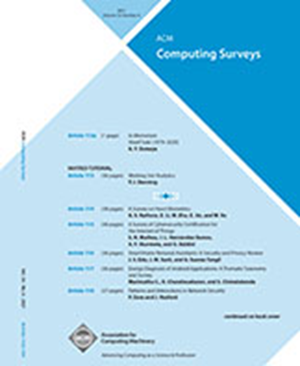Robust Recommender System: A Survey and Future Directions
IF 28
1区 计算机科学
Q1 COMPUTER SCIENCE, THEORY & METHODS
引用次数: 0
Abstract
With the rapid growth of information, recommender systems have become integral for providing personalized suggestions and overcoming information overload. However, their practical deployment often encounters “dirty” data, where noise or malicious information can lead to abnormal recommendations. Research on improving robustness of recommender systems against such dirty data has thus gained significant attention. This survey provides a comprehensive review of recent work on robust recommender systems. We first present a taxonomy to organize current techniques for withstanding malicious attacks and natural noise. We then explore state-of-the-art methods in each category, including fraudster detection, adversarial training, certifiable robust training for defending against malicious attacks, and regularization, purification, self-supervised learning for defending against malicious attacks. Additionally, we summarize evaluation metrics and commonly used datasets for assessing robustness. We discuss robustness across varying recommendation scenarios and its interplay with other properties like accuracy, interpretability, privacy, and fairness. Finally, we delve into open issues and future research directions in this emerging field. Our goal is to provide readers with a comprehensive understanding of robust recommender systems and to identify key pathways for future research and development. To facilitate ongoing exploration, we maintain a continuously updated GitHub repository with related research: https://github.com/Kaike-Zhang/Robust-Recommender-System.鲁棒推荐系统:综述及未来发展方向
随着信息的快速增长,推荐系统已成为提供个性化建议和克服信息过载的重要组成部分。然而,它们的实际部署经常遇到“脏”数据,其中噪声或恶意信息可能导致异常推荐。因此,提高推荐系统对此类脏数据的鲁棒性的研究得到了极大的关注。这项调查提供了一个全面的审查,最近的工作稳健的推荐系统。我们首先提出了一个分类法来组织当前抵御恶意攻击和自然噪声的技术。然后,我们在每个类别中探索最先进的方法,包括欺诈者检测,对抗性训练,防御恶意攻击的可认证稳健训练,以及防御恶意攻击的规范化,净化,自我监督学习。此外,我们总结了评估指标和常用的数据集,以评估稳健性。我们讨论了不同推荐场景的鲁棒性及其与其他属性(如准确性、可解释性、隐私性和公平性)的相互作用。最后,我们对这一新兴领域的开放性问题和未来的研究方向进行了深入探讨。我们的目标是为读者提供健壮的推荐系统的全面了解,并确定未来研究和发展的关键途径。为了便于继续探索,我们维护了一个不断更新的GitHub存储库,其中包含相关研究:https://github.com/Kaike-Zhang/Robust-Recommender-System。
本文章由计算机程序翻译,如有差异,请以英文原文为准。
求助全文
约1分钟内获得全文
求助全文
来源期刊

ACM Computing Surveys
工程技术-计算机:理论方法
CiteScore
33.20
自引率
0.60%
发文量
372
审稿时长
12 months
期刊介绍:
ACM Computing Surveys is an academic journal that focuses on publishing surveys and tutorials on various areas of computing research and practice. The journal aims to provide comprehensive and easily understandable articles that guide readers through the literature and help them understand topics outside their specialties. In terms of impact, CSUR has a high reputation with a 2022 Impact Factor of 16.6. It is ranked 3rd out of 111 journals in the field of Computer Science Theory & Methods.
ACM Computing Surveys is indexed and abstracted in various services, including AI2 Semantic Scholar, Baidu, Clarivate/ISI: JCR, CNKI, DeepDyve, DTU, EBSCO: EDS/HOST, and IET Inspec, among others.
 求助内容:
求助内容: 应助结果提醒方式:
应助结果提醒方式:


